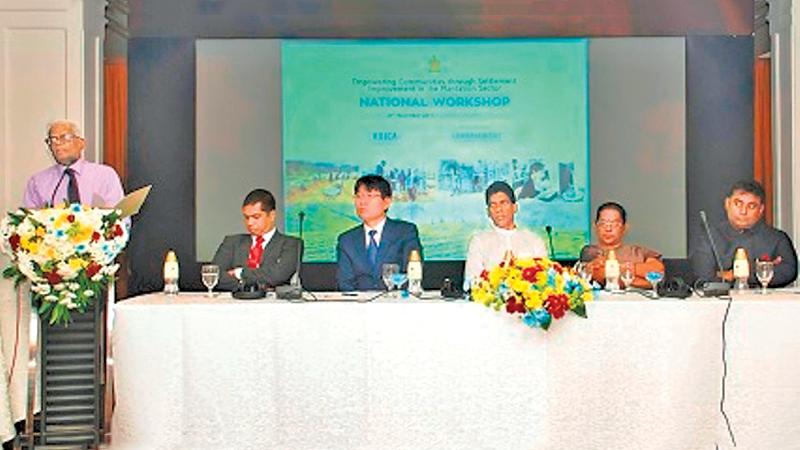
The way forward for the plantation sector development would be through women’s empowerment; employment opportunities for the educated youth; more tertiary education opportunities and creating an attitude of belongingness through land ownership. This was revealed at the National Conference for Empowering Communities through Settlement Improvement in the Plantation Sector, held recently in Colombo.
 The aim of the conference was to share good practices and lessons learnt of the Human Development Initiative (HDI) project which is currently being implemented in the Nuwara Eliya District and to highlight key issues pertaining to integration of Sri Lanka’s plantation sector into mainstream development in the country, explained Dr. Chanaka Talpahewa, Country Programme Manager, UN -Habitat. The project is implemented in collaboration with the Ministry of Hill Country New Villages, Infrastructure and Community Development (MHCNVICD) and funded by the Korea International Cooperation Agency (KOICA).
The aim of the conference was to share good practices and lessons learnt of the Human Development Initiative (HDI) project which is currently being implemented in the Nuwara Eliya District and to highlight key issues pertaining to integration of Sri Lanka’s plantation sector into mainstream development in the country, explained Dr. Chanaka Talpahewa, Country Programme Manager, UN -Habitat. The project is implemented in collaboration with the Ministry of Hill Country New Villages, Infrastructure and Community Development (MHCNVICD) and funded by the Korea International Cooperation Agency (KOICA).
Delivering the keynote address, Advisor to the MHCNVICD M. Vamadevan pointed out the need for empowering the plantation sector youth through increased access to tertiary education and providing employment opportunities that complement their education and employment aspirations. Currently, though there is a horizontal movement from the plantation sector to the urban sector as unskilled labour the need is to create avenues for vertical movement in all sectors, he commented. Female participation in governance is another key factor, he said.
Good planning and designing with a vision of the future is a crucial factor when it comes to sustainable human settlements, commented Sirinivasa Popuri, Senior Human Settlement Officer, UN-Habitat Asia Pacific. Lessons learnt from around the world had shown that while the cost of planning is USD 1, the cost of repair and reconstruction at present is USD 110. This could be averted by implementing the 5 parameters – compactness, mixed and economic use of space, social mix, zoning and efficacy. He further commented on the success of the current project in Nuwara Eliya due to being community driven and owned; and adapted to the local setting and needs of the people.
The application of the ‘leave no one behind’ principle is an important aspect in sustainable development, stated Lee Dong-Ku, Resident Representative KOICA in his address to the gathering. Multi-sectoral objectives, comprehensive goal setting, inclusive partnership and capacity building of the community are the other aspects. Any sustainable development project should take the vulnerability of the communities - especially, in the estate sector – to climate change, he said.
Rajini Nadarasapillai, Secretary, MHCNVICD provided an overview of the National Plan of Action for the Plantation Community while an expert panel from the plantation, development and state sectors discussed settlement planning, infrastructure and housing; governance and legal aspects; and lessons learnt in implementing projects in the plantation sector.
The conference brought together experts from the plantation sector, housing and infrastructure development; regional plantation companies, policy makers, government officials, donors, development practitioners and academics. Minister U. Palani Digambaram was the chief guest.
